Keresés: %s
Keresés: %s
At the informal meeting of the General Assembly, the Head of thee International, Impartial and Independent Mechanism presented the first report of the IIIM on the implementation of its mandate
On 18 April 2018, Catherine Marchi-Uhel, Head of the International, Impartial and Independent Mechanism to Assist in the Investigation and Prosecution of Persons Responsible for the Most Serious Crimes under International Law Committed in the Syrian Arab Republic since March 2011 presented the first report of the IIIM for the member states. Hungary supports the mechanism and contributes to its funding.
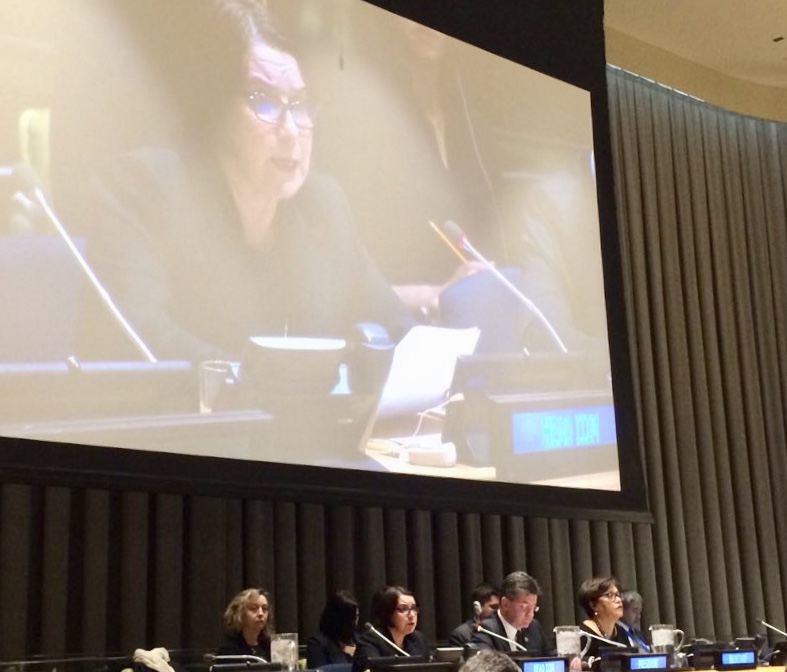
On 18 April 2018, at the informal debate of the General Assembly, Catherine Marchi-Uhel, Head of the International, Impartial and Independent Mechanism to Assist in the Investigation and Prosecution of Persons Responsible for the Most Serious Crimes under International Law Committed in the Syrian Arab Republic since March 2011 presented the first report of the IIIM on the implementation of its mandate.
Ms. Marchi-Uhel presented objectives and underlying principles of the Mechanism, the steps taken to get the IIIM up and running as well as future challenges of the Mechanism. The informal debate was an excellent opportunity for the International Community to send a clear message that impunity for the atrocities committed in Syria must end. All those responsible for breaches of international law, in particular of international humanitarian law some of which may constitute war crimes or crimes against humanity, must be held accountable. Justice and accountability are essential to any future sustainable peace in Syria.
Hungary is a strong supporter of IIIM. We welcome the first report of the Mechanism and highly appreciate the leadership and efforts of Ms. Catherine Marchi-Uhel. Effective functioning of IIIM is vital; therefore, the Hungarian Government has decided to renew its voluntary contribution of 50.000 Euro (offered last year) for 2018 as well.
Ending the culture of impunity is a major contributor to conflict prevention and sustaining peace on national and international levels. The path to justice can be long, but we must act now to ensure that the UN takes all the steps necessary towards an effective international mechanism for Syria.
Benjamin Ferencz, last surviving prosecutor at the Nuremberg trials has expressed his views regarding international peace and justice at the High-Level Event “Atrocity Prevention and the Fight against Impunity”
On 30 April 2018, the Hungarian born, Benjamin Ferencz, former prosecutor for the Nuremberg Tribunal has expressed his views regarding international peace and justice at the High-Level Event “Atrocity Prevention and the Fight against Impunity” organized by Denmark and Rwanda as well as the Global Centre for Responsibility to Protect.
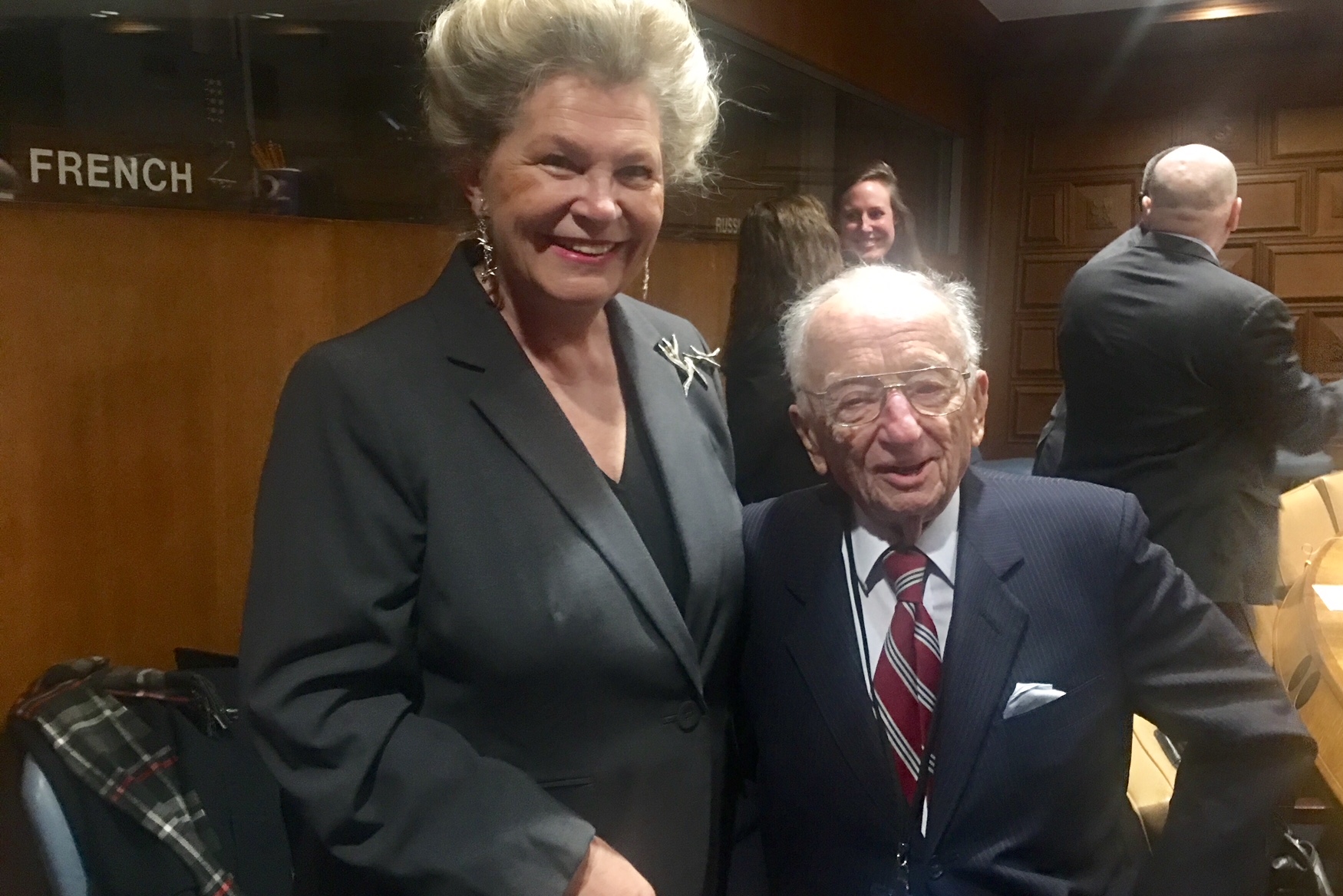
“We need tolerance, compassion and the will and ability for compromise. No double standards are acceptable.” – it can be summarized as the main message of the speakers. UN Special Adviser on Genocide Prevention Adama Dieng has stressed the influence of bolstering domestic capacity to investigate atrocity crimes, the International Criminal Court cannot do it all.
Mr. Ferencz has highlighted: “we have the responsibility to protect, but we have a bigger responsibility to prevent”. During his life, Ben Ferencz was fighting against impunity but for peace and justice. He also affirmed “Next goal is to change hearts and minds of the people: the current system we live in is cruel and dangerous. We need more tolerance, sympathy, compassion and compromises”.
H.E. Ambassador Katalin Annamária Bogyay, permanent representative of Hungary has emphasized in her speech the importance of education and changing minds. She has reiterated Hungary’s supports of various international instruments, among others the International Criminal Court as well as the ACT Code of Conduct initiative to protect civilians from mass atrocity crimes – genocide, war crimes, ethnic cleansing and crimes against humanity.
In closing the event, the 98-year old former prosecutor, international lawyer, Mr. Ferencz has shared some wisdoms with the attendees: “I leave you with three pieces of advice: 1. Never give up. 2. Never give up. 3. Never give up.”
H.E. Mr. Péter Szijjártó met Under-Secretary-General for Political Affairs
H.E. Mr. Péter Szijjártó Hungarian Minister for Foreign Affairs and Trade, and Under-Secretary-General for Political Affairs H.E. Ms. Rosemary DiCarlo had an introductory meeting where avenues of cooperation, the support of preventive diplomacy, fight against terrorism, migration and the Western Balkan policy were discussed. Ms. DiCarlo succeeds Jeffrey Feltman of the United States, who completes his assignment on 31 March 2018. Ms. DiCarlo has more than 35 years of experience in public service and academia, and served as inter alia Deputy Permanent Representative to the United Nations.
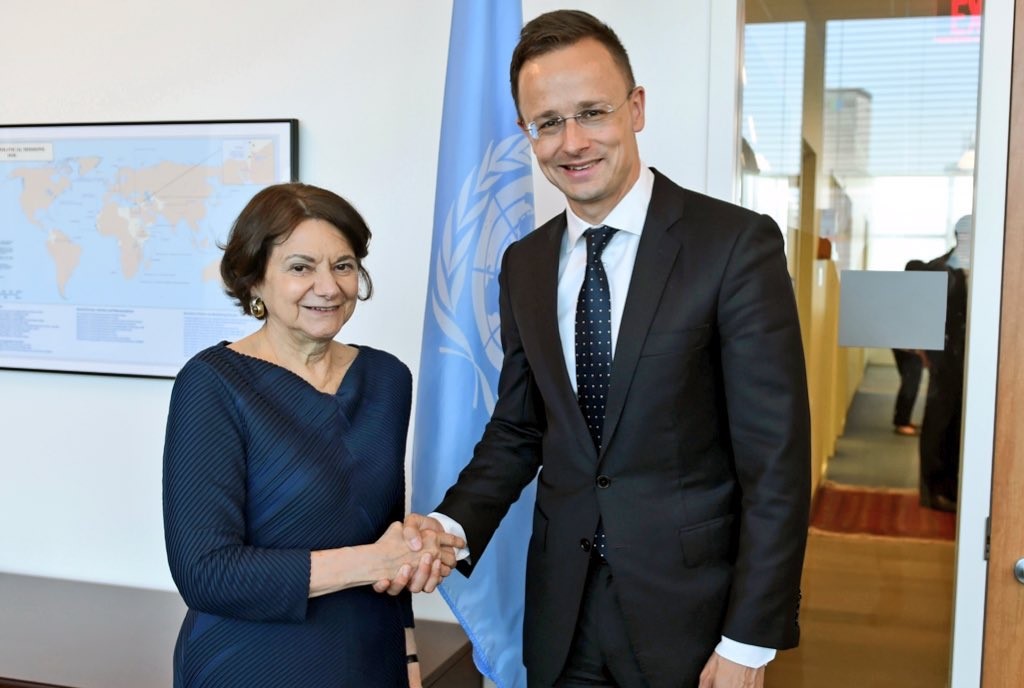
On the margin of Security Council open briefing on Ukraine Minister Szijjártó met his Ukrainian counterpart, H.E. Pavlo Klimkin, Minister for Foreign Affairs, to establish an intergovernmental working group in order to follow up the implementation of the decision of the Venice Comission on the Ukrainian educational law. “Our goal is for Transcarpathian Hungarians to be given back the rights that they were previously afforded and guaranteed”, Mr. Szijjártó declared. “Our goal is also to enable us to return to our policy, which in Ukraine’s case was built on supporting our neighbours’ European and Euro-Atlantic integration processes”, he added.
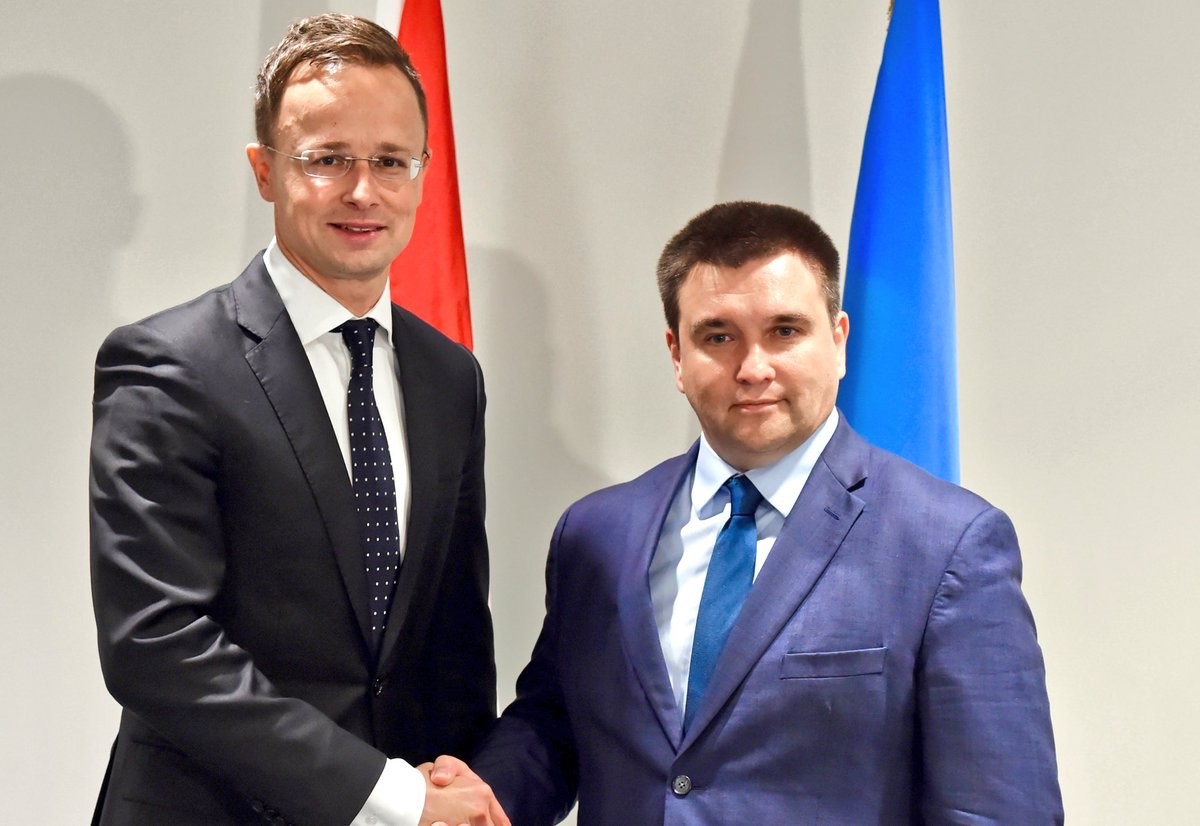
H.E. Mr. Péter Szijjártó, Hungary’s Minister of Foreign Affairs and Trade took part in the fifth round of intergovernmental negotiations on the UN Global Compact for Migration (GCM)
The agenda of the fifth round of intergovernmental negotiations on the UN Global Compact for Migration (GCM) consists of detailed discussions of the second revised draft of the document, as circulated by the co-facilitators from Mexico and Switzerland on 28 May.
H.E. Mr. Péter Szijjártó took the floor on the first day in a national capacity and expressed Hungary’s views on the second revised draft based on the position that migration cannot be perceived as a positive phenomenon, while it presents risks and security challenges for the countries of origin, transit and destination at the same time.
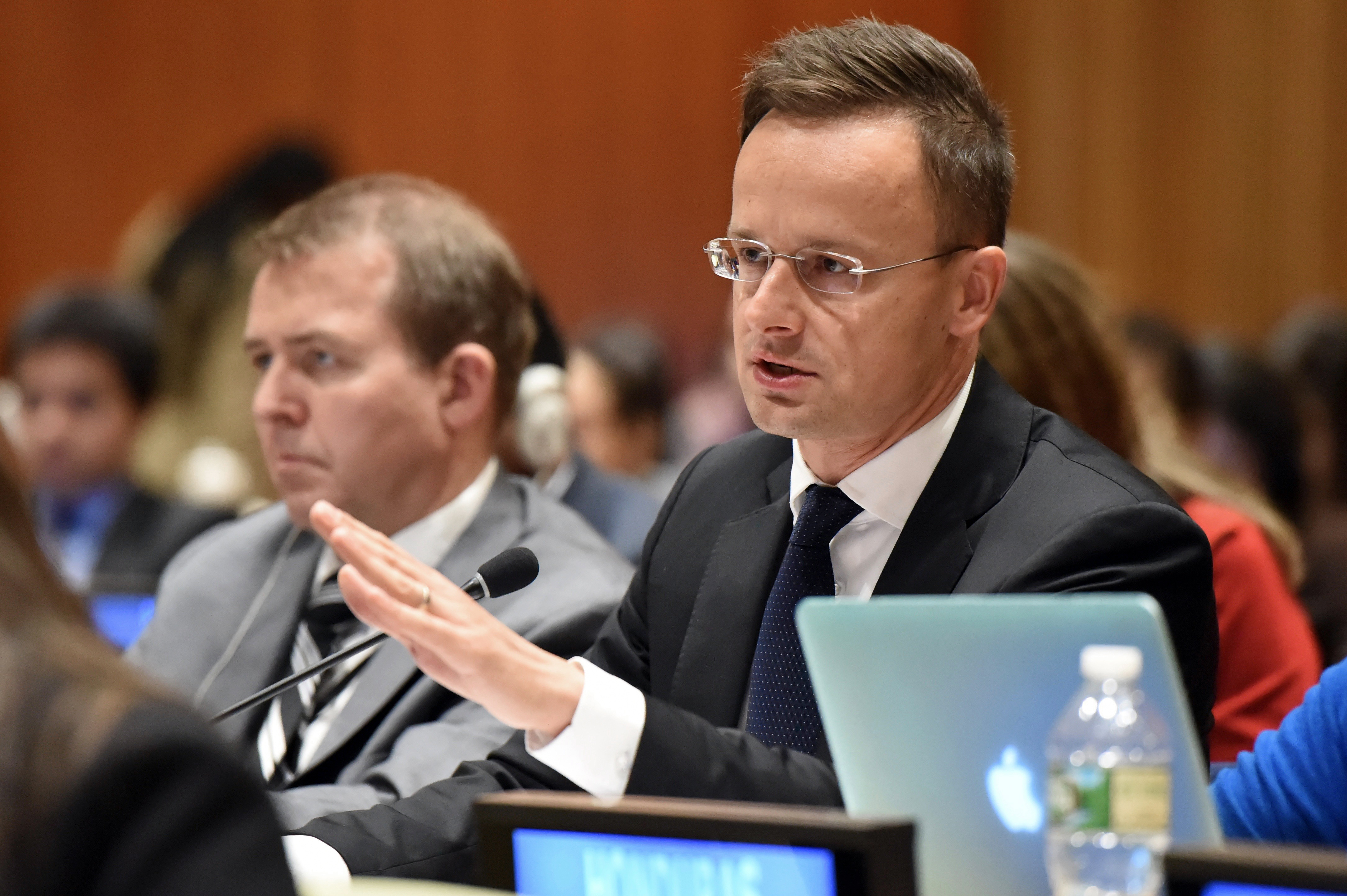
Hungary sees three major red lines in the second revised draft of the GCM document: migration cannot be considered as a basic human right; border protection is not an option, but an obligation of states, therefore illegal border crossing is a criminal offense and cannot be seen as an administrative category. Last but not least, migration is not the right answer to demographic and economic challenges. Every State should have the right to decide on its own policies and tools to shape the social system and tackle labor market needs. While respecting other Member States’ prerogatives in this regard, Hungary will continue to take decisions based on its national sovereignty regarding sectorial policies and migration.
On the margin of the GCM negotiations, H.E. Mr. Péter Szijjártó met H.E. Mr. Miroslav Lajčák, President of the UN General Assembly, to take stock of the migration file and to discuss preparations for the meeting of the High Level Political Forum (HLPF) in July. Minister Szijjártó had a bilateral meeting with H.E. Ms. María Fernanda Espinosa, the Foreign Minister of Ecuador, candidate for the presidential post of the 73rd session of the General Assembly.
Also in a bilateral setup, Minister Szijjártó held talks with Under-Secretary General Mr. Liu Zhenmin, head of DESA on the run-up to Hungary’s first National Voluntary Review presentation on progress in achieving SDG 6 on water and sanitation. Hungary has a lot to offer in terms of technologies and best practices on sustainable water resources management and looks forward to a closer cooperation with its UN and Member State partners on that.
Celebrating Rabbi Arthur Schneier and the importance of religious and cultural dialogue
On 12 June 2018 Rabbi Schneier was presented the ‘"A cry for freedom" commemorative bronze statute by Ambassador Katalin Bogyay on the occasion of the fortieth anniversary of the return of the Holy Crown of St. Stephen from the United States to Hungary.
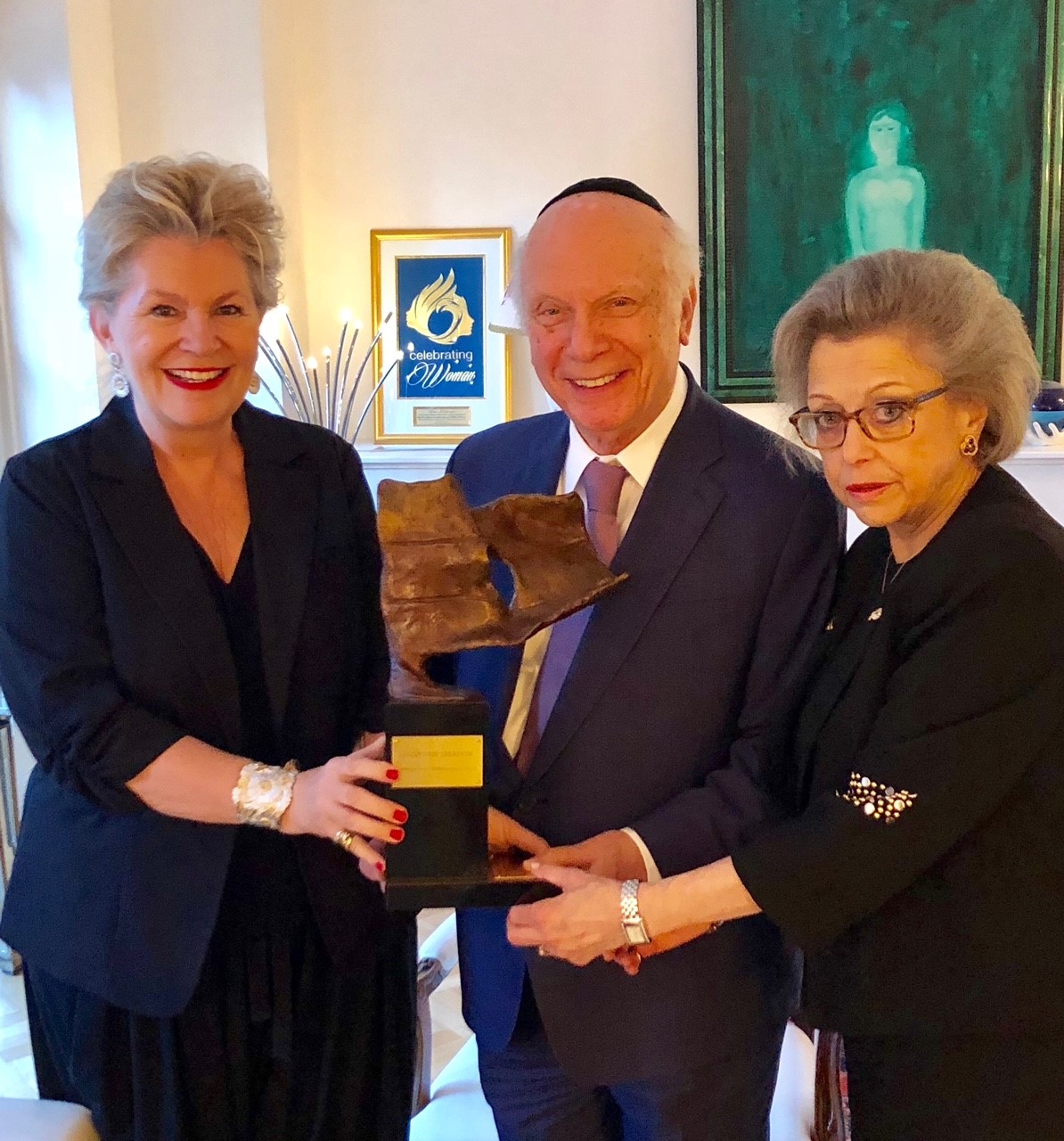
The Holy Crown is a living symbol of the Hungarian State and has long and eventful history. Hungary lost the Holy Crown at the end of the Second World War and it was returned to us in 1978 at a historic and emotional ceremony where religious, academic, scientific and cultural leaders represented our country. Rabbi Schneier was a member of the US delegation returning the Holy Crown to Hungary and his personal commitment and contribution to this mission is of utmost importance.
Rabbi Schneier’s efforts to promote and support religious freedom, human rights and tolerance with the Appeal of Conscience Foundation and his contribution to the strengthening of ties between Hungary and the United States are greatly valued in Hungary.
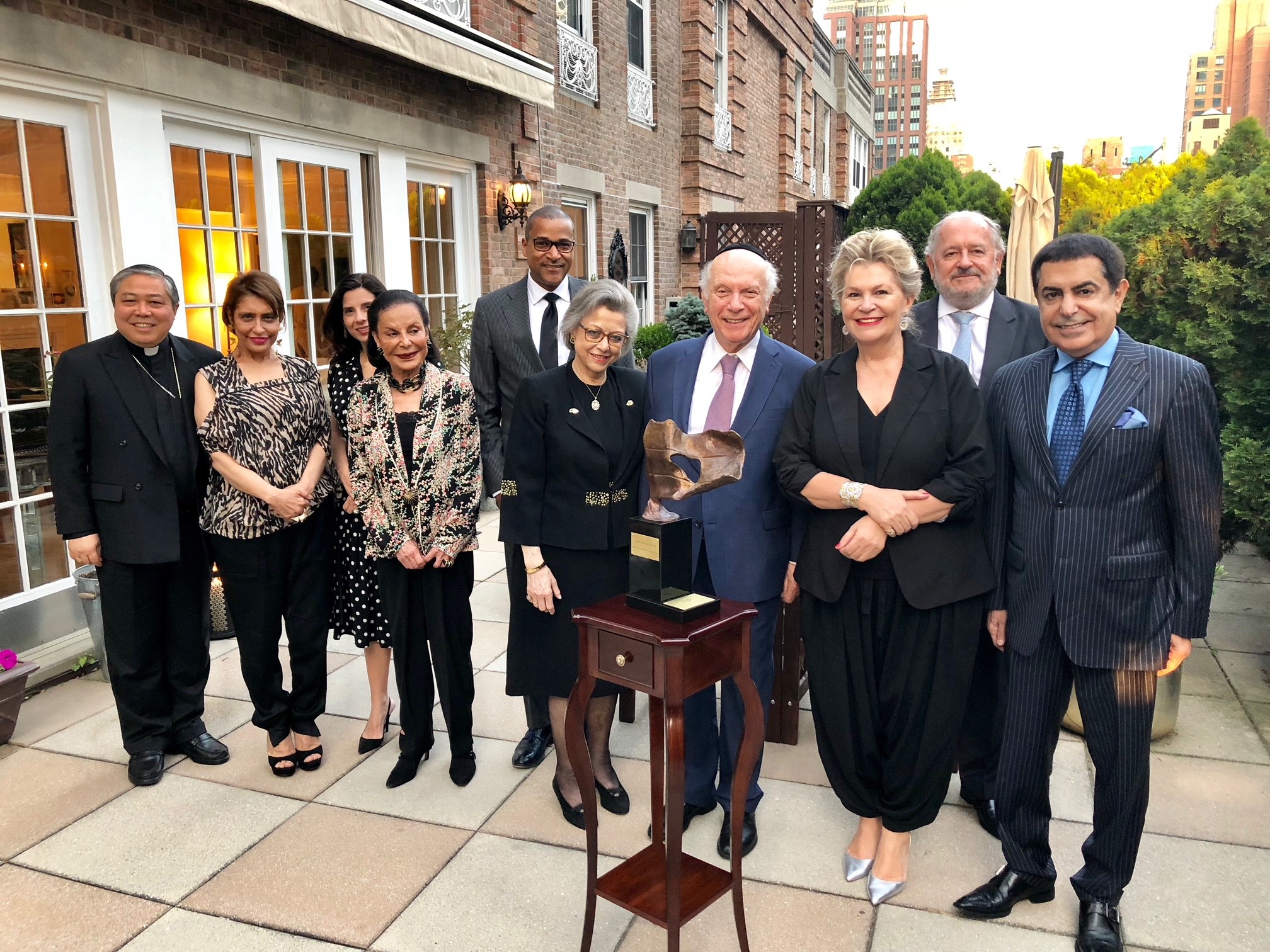
In the spirit of interreligious dialogue, a dinner was hosted by Ambassador Bogyay in honour of Rabbi Schneier in the company of H.E. Archbishop Auza, Apostolic Nuncio, Permanent Observer to the United Nations, H.E. Al-Nasser, High Representative of the United Nations Alliance of Civilizations, H.E. Mr. Rattray, Permanent Representative of Jamaica, Ms. Leah and Judit Pisar of the Projet Aladin.
The statute stands as a symbol of aspiration to peace and a reminder that freedom can never be taken for granted. The bronze statute designed by Hedva Ser, renown French artist, UNESCO Goodwill Ambassador for Cultural Diplomacy and Artist for Peace.
A dinner to remember the heroic life of Povl Bang-Jensen
On the occasion of a new research project led by Professor András Nagy on Povl Bang-Jensen, the Danish diplomat who helped to save many lives after the 1956 Hungarian Revolution, a dinner was hosted by Ambassador Bogyay in the company of H.E. Mr. Ib Petersen, Permanent Representative of Denmark to the United Nations; Ms. Bridget Sisk, Chief of the UN Archives and Records Management and a guest of honor Per Bang-Jensen, Povl Bang-Jensen’s son.

Professor Nagy, a Hungarian historian, dedicated a great part of his life to researching the heroic life of Mr. Bang-Jensen, who is still considered a national hero in Hungary. In 2016, by the request of the Hungarian Mission to the UN, many hundreds of pages of the classified 1956 Revolution-related documents were opened up for research by the public. During dinner, András Nagy shared his research findings on these recently declassified documents. The participants also discussed possible avenues of future cooperation.
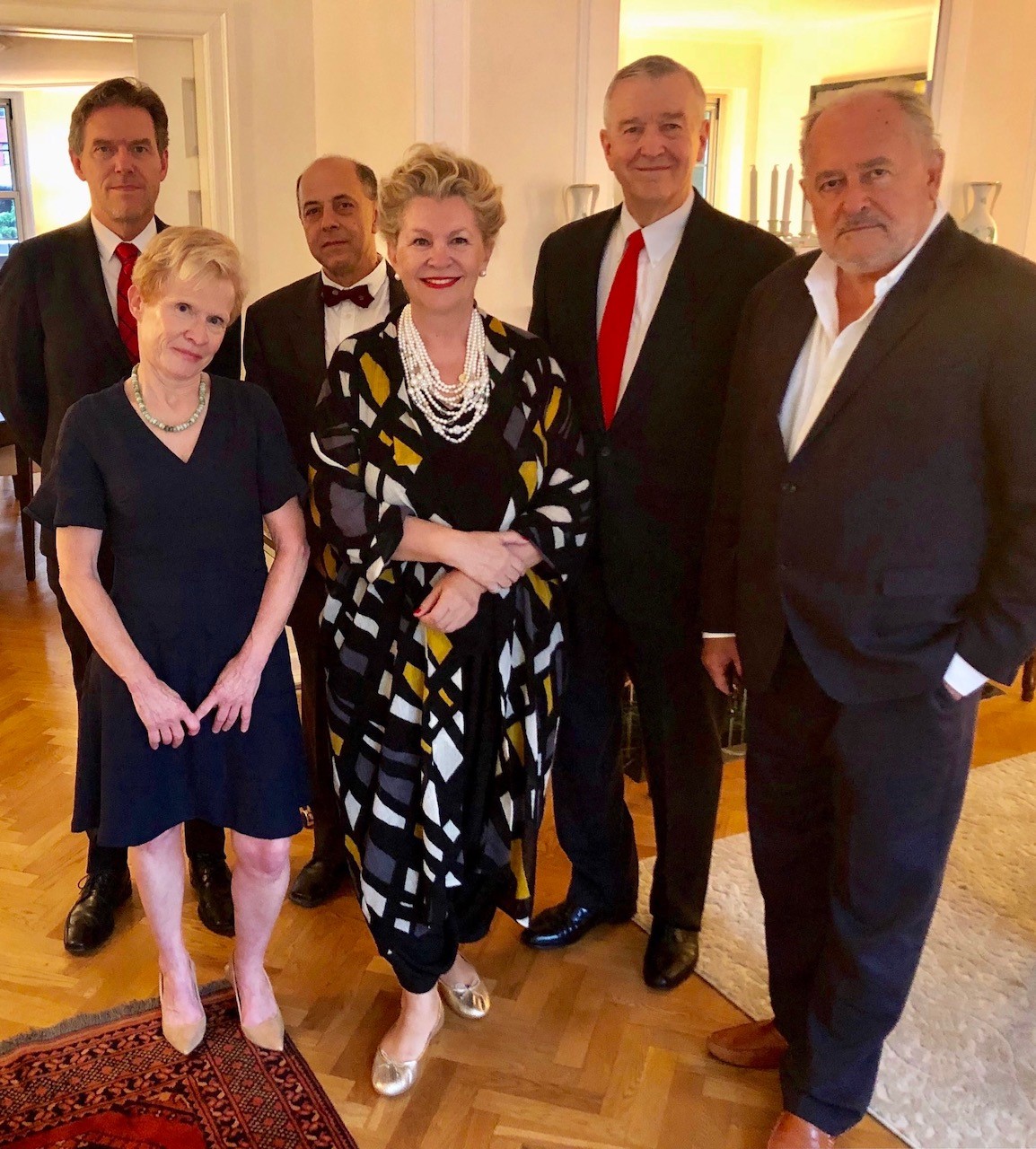
Minister János Martonyi, outgoing Chair of UNCITRAL opened the 51st Session of the United Nations Commission on International Trade Law
On 25 June 2018, H. E. Prof. Dr. János Martonyi, former Foreign Minister of Hungary and chair of the United Nations Commission on International Trade Law (UNCITRAL) opened its 51st Session in New York.
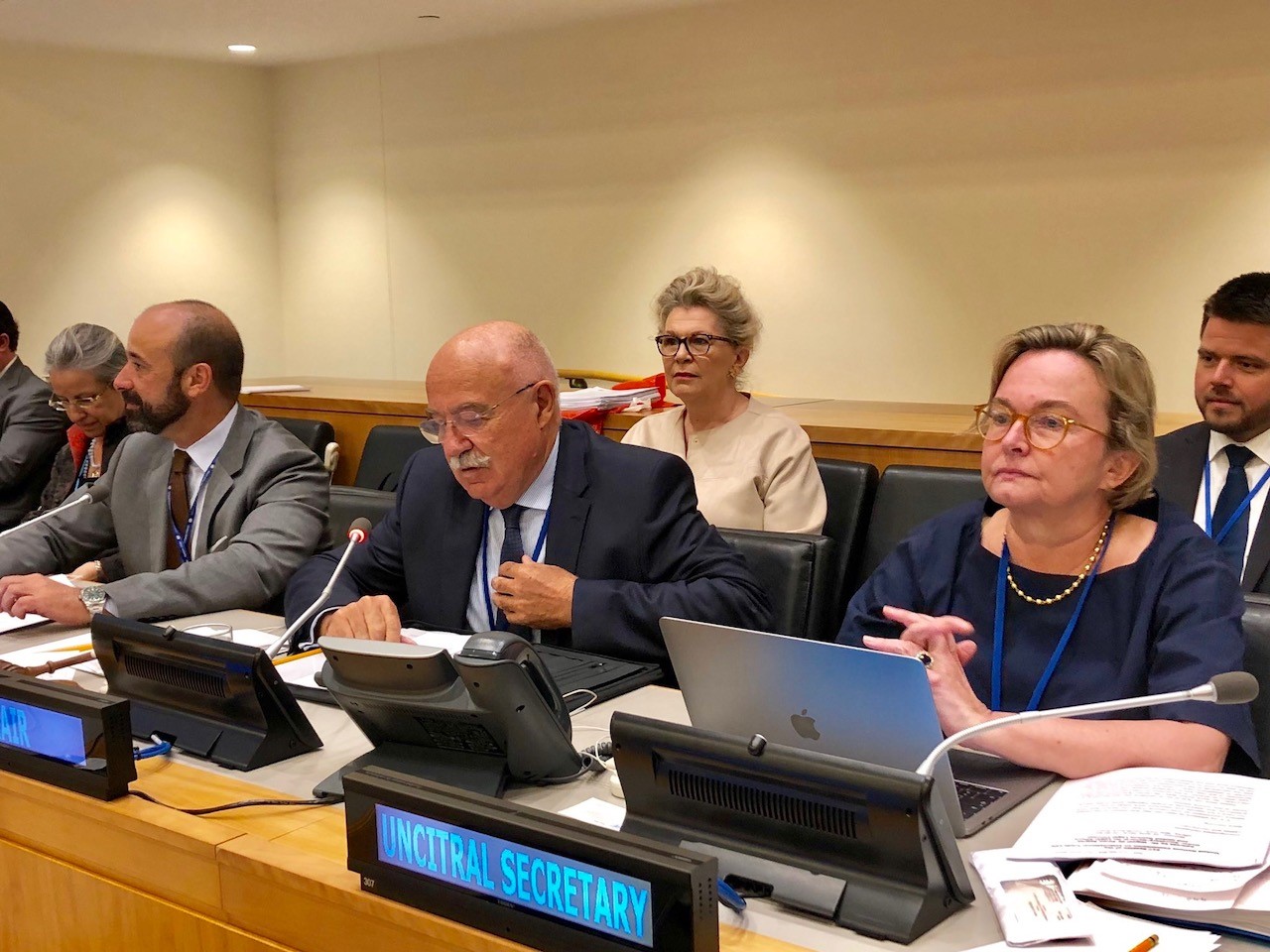
After the opening remarks of Mr. Miguel de Serpa Soares, Under-Sectretary-General for Legal Affairs, Minister János Martonyi welcomed the newly elected chair, Prof. Dr. Beate Czerwenka from Germany, and vice-chair, Dr. Zoltán Nemessányi, deputy state-secretary of the Hungarian Ministry of Justice.
Hungary had a significant role in establishing UNCITRAL by initiating a GA resolution in 1966. UNCITRAL is mandated to harmonize and modernize international trade law, thereby creating an effective legal environment for international trade and commerce.
The Permanent Mission of Hungary to the United Nations congratulates the newly elected chair and vice-chair and wishes them a great success in their future work.
Hungary calls for a more effective and faster cooperation and information sharing to prevent terrorism and violent extremism
On 28-29 June, the very first United Nations High-level Conference of Heads of Counter-Terrorism Agencies was convened by the United Nations Secretary-General at the United Nations Headquarters in New York. The overarching theme for the High-level Conference was “Strengthening international cooperation to combat the evolving threat of terrorism”. The four thematic sessions have reflected the priorities of Member States to improve international counter-terrorism cooperation.
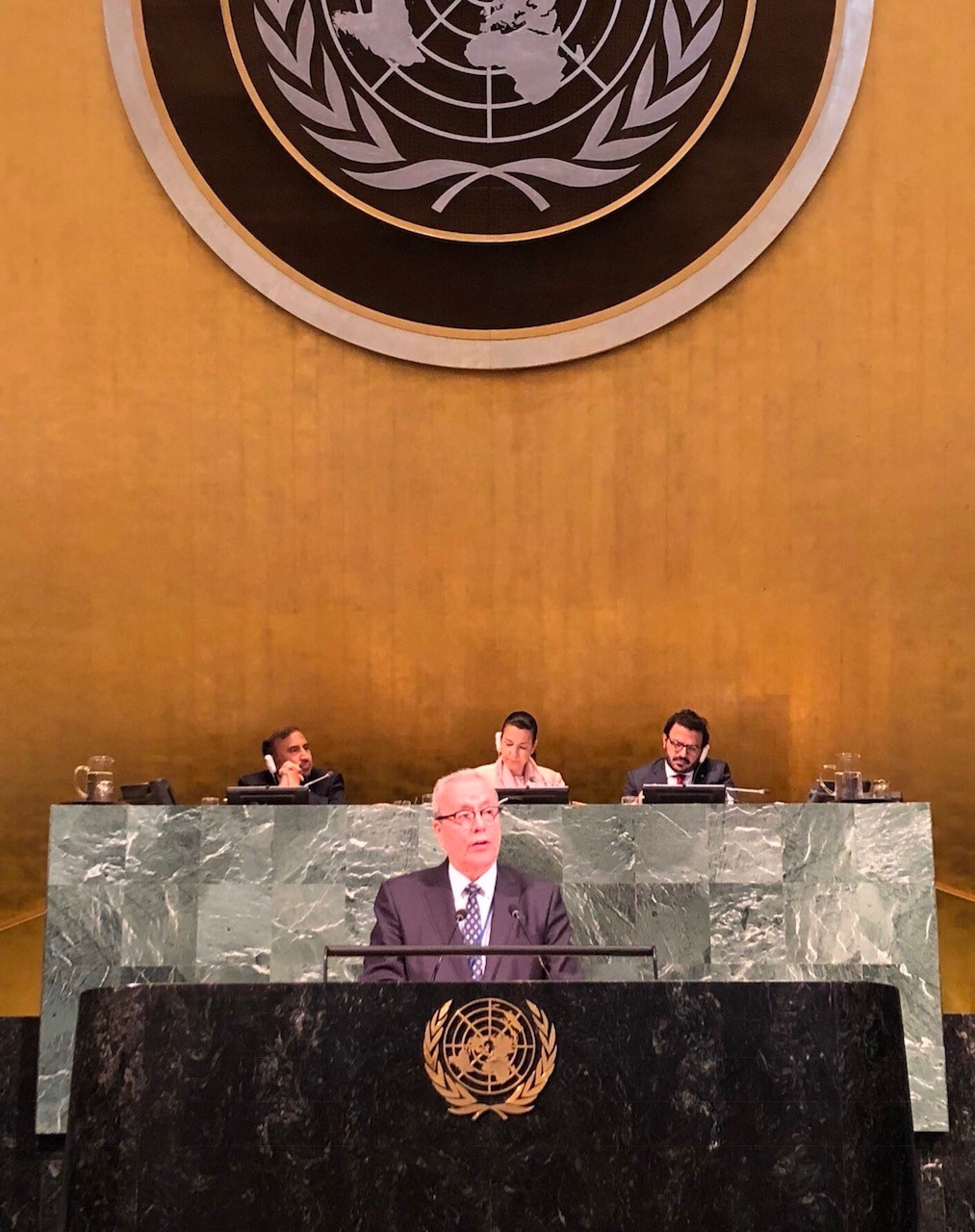
H.E. Dr. György Bakondi, Chief Security Advisor to the Hungarian Prime Minister, as the Head of the Hungarian Delegation has emphasized in his statement that collecting and distributing the information connected to counter-terrorism in the member states in a consistent and safe manner still is and will remain a task and obligation of paramount importance. He also stressed that the simplification of international channels could make the cooperation more efficient and faster, without violating national interests and objectives.
The Chief Security Advisor recalled the link between migration and terrorism. Hungary is strongly committed to establish such a counter-terrorism coordinators’ network, which is able to contribute to performing the analyzing and evaluating tasks on the national level so, that it provides insight into the details of the existing experience, recommendations and analyses of the member states.
On the margin of the Conference, H.E. Dr. Bakondi has met H.E. Vladimir Voronkov, Under-Secretary-General for counter-terrorism and exchanged their views on various common topics, such the importance of strengthening the international cooperation between the UN and its Member States and sharing information as well as best practices with each other. Mr. Voronkov appreciated Hungary’s commitment and efforts to preventing terrorism and violent extremism.
Click here to read the full statement.
Closure of the Intergovernmental Negotiations on the UN Global Compact for Migration
<p><img alt="" src="/assets/52/19/66/42179700dd1fed218246e9a343f137cdc3ada2cf.jpg" /></p>
On 13 July 2018, the Permanent Representatives of Mexico and Switzerland to the UN handed over the final draft of the UN Global Compact for Migration (GCM) to the President of the General Assembly in their capacity of co-facilitators, which marked the end of the Intergovernmental Negotiations.
Hungary was represented at the closing session by H.E. Mr. Péter Szijjártó, Minister of Foreign Affairs and Trade of Hungary, who delivered a national statement after the President of the General Assembly, the Deputy Secretary General, and the Secretary General’s Special Representative on International Migration.
By thanking the co-facilitators for their efforts in leading the process, and also for the improvements they managed to achieve in the overall balance of the GCM text as compared to the Zero Draft, Minister Szijjártó expressed his concerns on the final package, which still crosses major “red lines” for Hungary’s position, starting with its basic approach. The Government of Hungary will consider the final text at its next meeting, with a view to launching the eventual disassociation in due course.
Read Hungary’s position on migration and on the GCM, laid down by the Government in 12 points.
Click here to read the statement of H.E. Mr Péter Szijjártó.
On 18 July 2018, after the Cabinet meeting of the Government, Hungary has disassociated itself from the text of the GCM.
Presentation of Hungary’s first Voluntary National Review of SDG implementation at the High Level Political Forum
Hungary’s first Voluntary National Review on the implementation of the Sustainable Development Goals (SDGs) presented by H.E. Mr László Palkovics, Minister of Innovation and Technology on 18 July 2018 focused on the goals on water and sanitation, energy provision, sustainable cities, responsible consumption and production, and balanced ecosystems. These priorities underpin Hungary’s policies to achieve long term sustainable development in a crosscutting manner, through synergies enhanced by innovation and technology.
The UN High-level Political Forum (HLPF) is the central platform for the follow-up and review of the 2030 Agenda and its Sustainable Development Goals (SDGs). HLPF provides the opportunity for exchange of views, and sharing of experiences and best practices with the full and effective participation of all States Members and stakeholders on a yearly basis.
The theme of this year’s HLPF from 9 to 18 July 2018 was “Transformation towards sustainable and resilient societies". The ministerial meeting of the forum took place from 16 to 18 July 2018. During the ministerial meeting 47 countries presented their Voluntary National Reviews on the six selected SDGs: Goal 6. to ensure availability and sustainable management of water and sanitation for all; Goal 7. to ensure access to affordable, reliable, sustainable and modern energy for all; Goal 11. make cities and human settlements inclusive, safe, resilient and sustainable; Goal 12. to ensure sustainable consumption and production patterns; Goal 15. to protect, restore and promote sustainable use of terrestrial ecosystems, sustainably manage forests, combat desertification, and halt and reverse land degradation and halt biodiversity loss; as well as Goal 17. to strengthen the means of implementation and revitalize the Global Partnership for Sustainable Development.
Hungary’s report and presentation focused on SDGs 6, 7, 11, 12 and 15, which are intertwined and mutually reinforcing. Both in its national capacity and as a member of the European Union, Hungary is committed to achieve long term sustainable development in partnership with stakeholders.
Hungary’s presentation was followed by questions from other Member States and stakeholders, which showed vivid interest and illustrated the shared commitment to sustainability.
H.E. Mr. Péter Szijjártó, Minister of Foreign affairs and Trade of Hungary on CNN
Click here to see the interview with Minister Szijjártó and Amanpour.
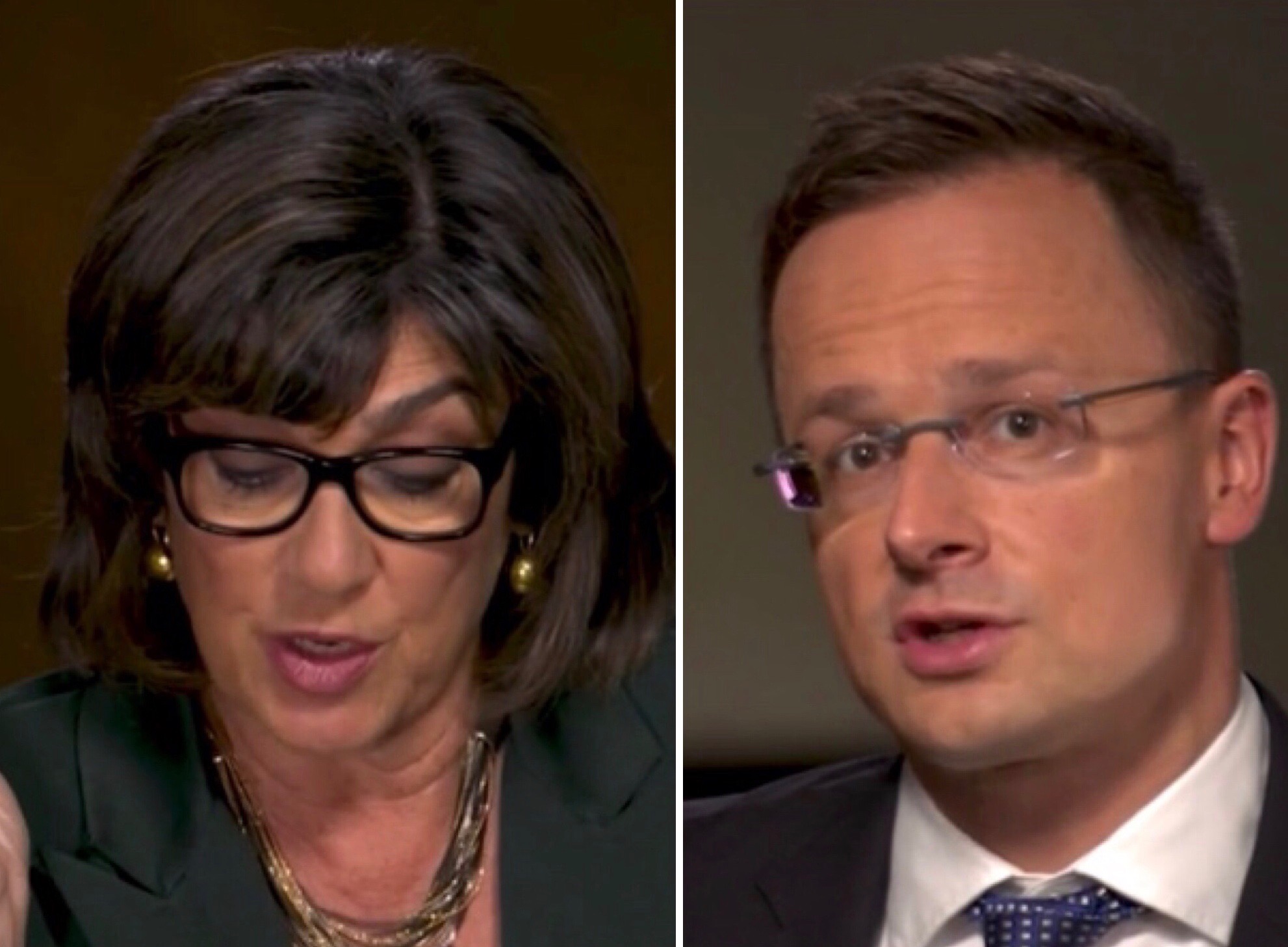
UN Youth Delegate of Hungary calls for inclusion and empowerment of youth
UN Youth Delegate of Hungary, Ms Ágnes Szuda, addressed the Third Committee of the UN General Assembly during its General Discussion on Social Development, highlighting the potential of youth to contribute to the achievement of sustainable social and economic development, with special regard to young persons with disabilities.
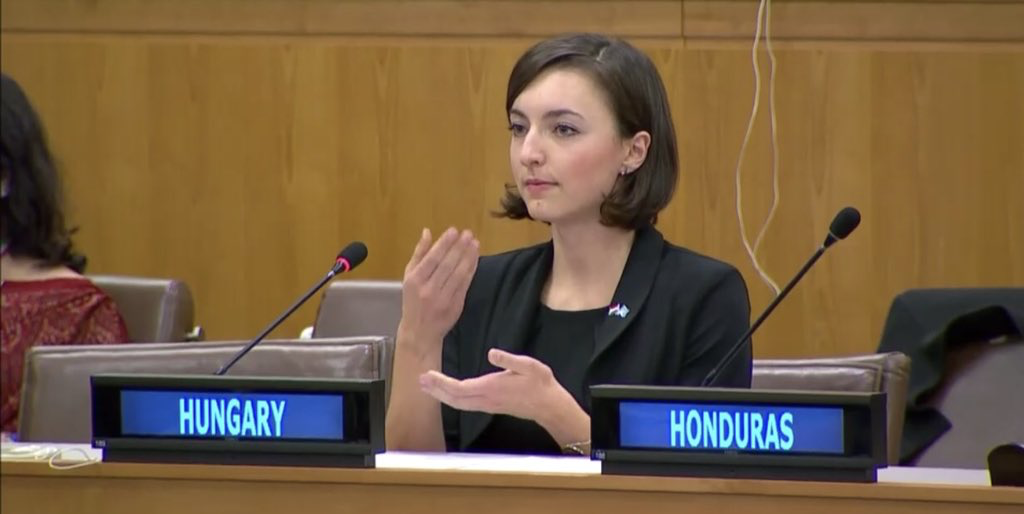
In her statement, Youth Delegate Ms Szuda emphasized the importance of quality education, labour market inclusion and participatory decision-making in empowering youth to achieve their full potential. She underlined the key role of social inclusion in creating an enabling environment for all – including women and girls, minorities or persons with disabilities, among others.
Expressing the need for the society as a whole to embrace all members of the society, Ms Szuda finished her statement in Hungarian sign language, calling on the international community to “work together for common brighter future”.
The statement can be accessed here.
Hungary joined the UN Youth Delegate Programme in 2015, enabling a talented student every year to fulfil a double mission: to represent Hungarian youth at the United Nations, and to raise awareness and educate on the aims and activities of the UN at home. Hungary is proud to welcome Ms Szuda as the third Delegate, who is working in cooperation with the Ministry of Human Capacities, the Ministry of Foreign Affairs and Trade of Hungary, as well as the Permanent Mission of Hungary to the United Nations in New York.
Hungary's presence at the High Level Week of the 73rd Session of the General Assembly
Minister of Foreign Affairs and Trade H.E. Mr Péter Szijjártó addressed the General Debate of the 73rd session of the General Assembly on 28 September, underlining the importance of international cooperation in migration.

Representing Hungary as the Head of the Hungarian Delegation to the High-level Week of the 73rd Session of the UN General Assembly, Minister of Foreign Affairs and Trade, H.E. Mr Péter Szijjártó addressed the General Debate of the General Assembly on 28 September. The minister also gave a national statement at the Nelson Mandela Peace Summit, and participated as a panellist at the high-level panel organized by UNESCO on the fight against anti-Semitism. In addition, the minister intervened at the high-level meeting on the Syrian crisis, at the ministerial-level side event on “Ensuring Justice for Syria”, discussing the role of the International Independent and Impartial Mechanism, and at the High-Level Meeting on Mali and the Sahel. Furthermore, H.E. Mr. Szijjártó made a statement at the high-level event of the Group of Friends of Mediation, and also took the floor at the Ministerial Meeting of the Group of Friends of the UN Alliance of Civilizations.
Minister Szijjártó emphasized the importance of the protection of persecuted Christians during a high-level panel discussion hosted by the Permanent Mission of Hungary to the United Nations. Moderated by H.E. Ambassador Katalin Annamária Bogyay, Permanent Representative of Hungary to the UN, the panel included distinguished speakers, such as H.E. Ambassador Nikki Haley, Permanent Representative of the United States to the UN; H.E. Archbishop Paul Richard Gallagher, Secretary for the Holy See’s Relations with States and H.E. Mr. Adama Dieng, UN Under-Secretary General, Special Adviser on the Prevention of Genocide.
Minister Szijjártó also participated at the ministerial meeting of the Visegrad Four countries,of the EU Council of Foreign Ministers, and at the ministerial lunch of the Central-European Initiative.
Moreover, the Minister attended the High Level Luncheon held by UN Secretary General António Guterres, and met with several prominent UN leaders, including H.E. Ms. María Fernanda Espinosa Garcés, President of the 73rd Session of the UN General Assembly; H.E. Mr. Jean-Pierre Lacroix, Under-Secretary-General for Peacekeeping Operations; H.E. Ms. Rosemary DiCarlo, Under-Secretary-General for Political Affairs; H.E. Ms. Henrietta Fore, Executive Director of UNICEF; H.E. Ms. Jan Beagle, Under-Secretary-General for Management and H.E. Mr. Tedros Ghebreyesus, Director-General of WHO.
On the margins of the High Level Week, Minister Szijjártó conducted more than 30 bilateral meetings with his Partners, signing eight bilateral agreements facilitating visa-free travel and granting educational, cultural and scientific scholarships. Mr. Szijjártó awarded H.E. Mr. Elmar Mammadyarov, Minister of Foreign Affairs of Azerbaijan, with the Order of Merit Commander's Cross with Star.
During his stay, Minister Szijjártó also met with H.E. Archbishop Timothy Dolan, and with the representatives of several distinguished American Jewish organizations.
Mr. Szijjártó gave several interviews and statements to international press and news agencies, including CNN, Al Jazeera English, Reuters, TASS, China Global Television Network, RTR, and CBN. During the High-Level Week of the 73rd Session of the General Assembly, six ministerial statements have been broadcasted live by the Hungarian National Television.
Clich here to read the statement of Minister Szijjártó.
Hungary re-elected to the United Nations Commission on International Trade Law (UNCITRAL)
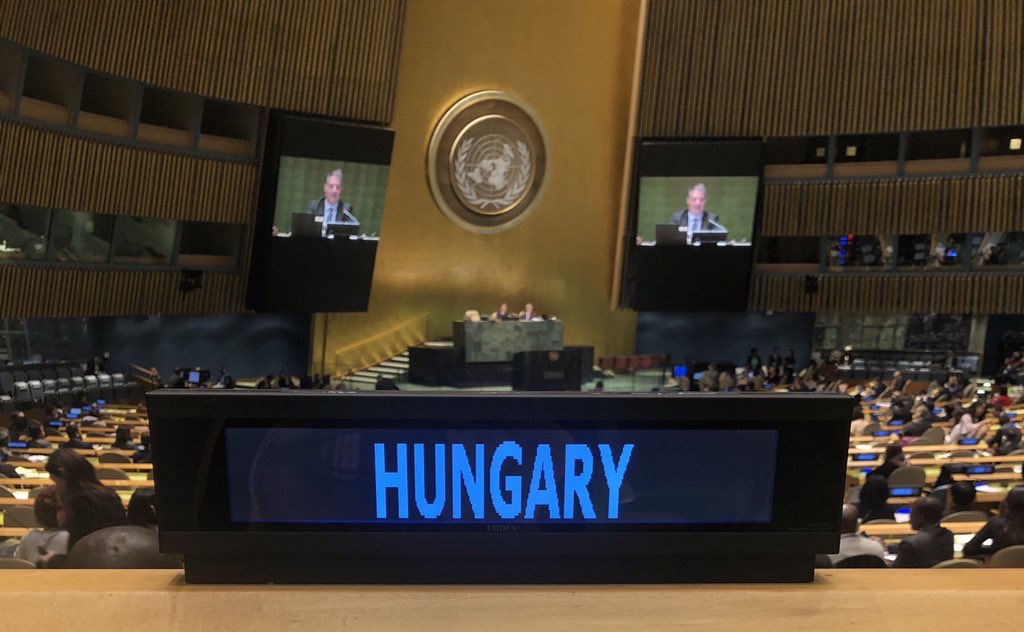
~~UNCITRAL was established by the General Assembly upon a Hungarian initiative in 1966 and is mandated to harmonize and modernize international trade law, by creating an effective legal environment for international trade and commerce. Hungary continues to play a significant role in the life of the Commission since H. E. Mr. János Martonyi, former Minister of Foreign Affairs of Hungary has been asked to be the honorary Chair of the 50th session, after which the Commission elected Dr. Zoltán Nemessányi, deputy state-secretary of the Hungarian Ministry of Justice as Vice-Chair of the current (51st) session.
On 17 December 2018, the General Assembly elected the following thirty new members to UNCITRAL: Hungary, Russian Federation, Ukraine, Croatia, China, Japan, Malaysia, Indonesia, Republic of Korea, Singapore, Viet Nam, France, Belgium, Canada, Germany, Finland, Switzerland, UK, Algeria, Cameroon, Cote D’Ivoire. Ghana, Mali, South Africa, Zimbabwe, Honduras, Ecuador, Mexico, Peru, Dominican Republic.
Hungary congratulates to and look forward to working with all new and old members of the Committee!
Security Council Open Debate on the impacts of climate related disasters on international peace and security
On January 25, 2019, His Excellency Péter Szijjártó, Minister of Foreign Affairs and Trade of Hungary, addressed the Security Council at its Open Debate on the impacts of climate related disasters on international peace and security. In his statement, Minister Szijjártó underlined the importance of addressing climate related disasters and the related security challenges such as migration. The Minister called upon the international community to focus their efforts on tackling the root causes in the affected countries to reduce the losses from these catastrophic events.
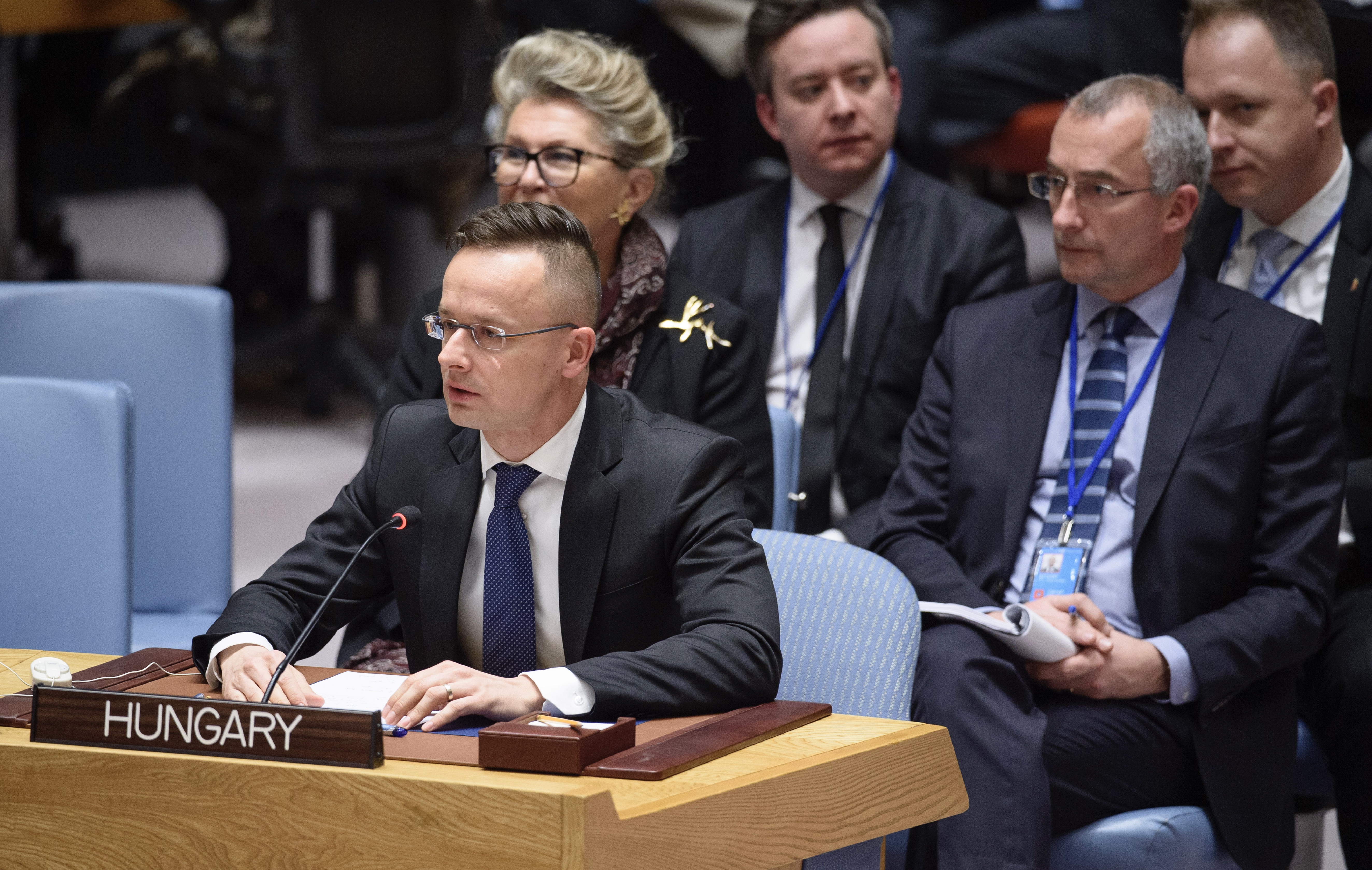
The Security Council, under the Presidency of the Dominican Republic, held its Open Debate on the impacts of climate related disasters on international peace and security, on January 25, 2019. The meeting focused on climate change as one of the most urgent challenges to the maintenance of international peace and security, and the need to continue to address climate-fragility risks in a sustained way.
His Excellency Péter Szijjártó, Minister of Foreign Affairs and Trade of Hungary described climate change as one of the greatest challenges of our time causing serious security risks generating additional massive flows of migration. Water scarcity, increasing level of the oceans, desertification, decreasing productivity of agricultural lands and demographic boom of certain regions are all among the negative effects of the rising global temperatures. According to forecasts 200 million people will hit the road to emigrate from their homeland due to environmental reason by 2050.
Minister Szijjártó stressed that migration is causing serious security concerns in Europe for the countries of origin, transit and destination at the same time. The international community should focus on tackling the root causes of the crises all around the World, instead of fostering migration.
The Minister reaffirmed that Hungary remains committed to keep migration policy in national competence and stressed the importance of border control and security of its citizens. The UN and the Member States need to put special emphasis on political, security, economic and environmental measures to support the states and regions in need of assistance to recover from climate related disasters.
On the margin of the UNSC Open Debate Minister Szijjártó conducted bilateral meetings with Sheikh Sabah Al-Khaled Al-Hamad Al-Sabah, Deputy Prime Minister and Minister of Foreign Affairs of Kuwait; Didier Reynders, Deputy Prime Minister and Minister for Foreign Affairs and Defence of Belgium; Retno Lestari Priansari Marsuidi, Minister for Foreign Affairs of Indonesia; Lord Tariq Mahmood Ahmad of Wimbledon, Minister of State for the Commonwealth and the United Nations and Izumi Nakamitsu, Under-Secretary-General and High Representative for Disarmament Affairs.
Hungary shares social and family policies at Commission for Social Development
The Commission for Social Development holds its 57th Session from 11-22 February, 2019, at the UN Headquaters. At the General Debate of the session, Hungary emphasized the importance of family-responsive and social policies in the elimination of inequalities.
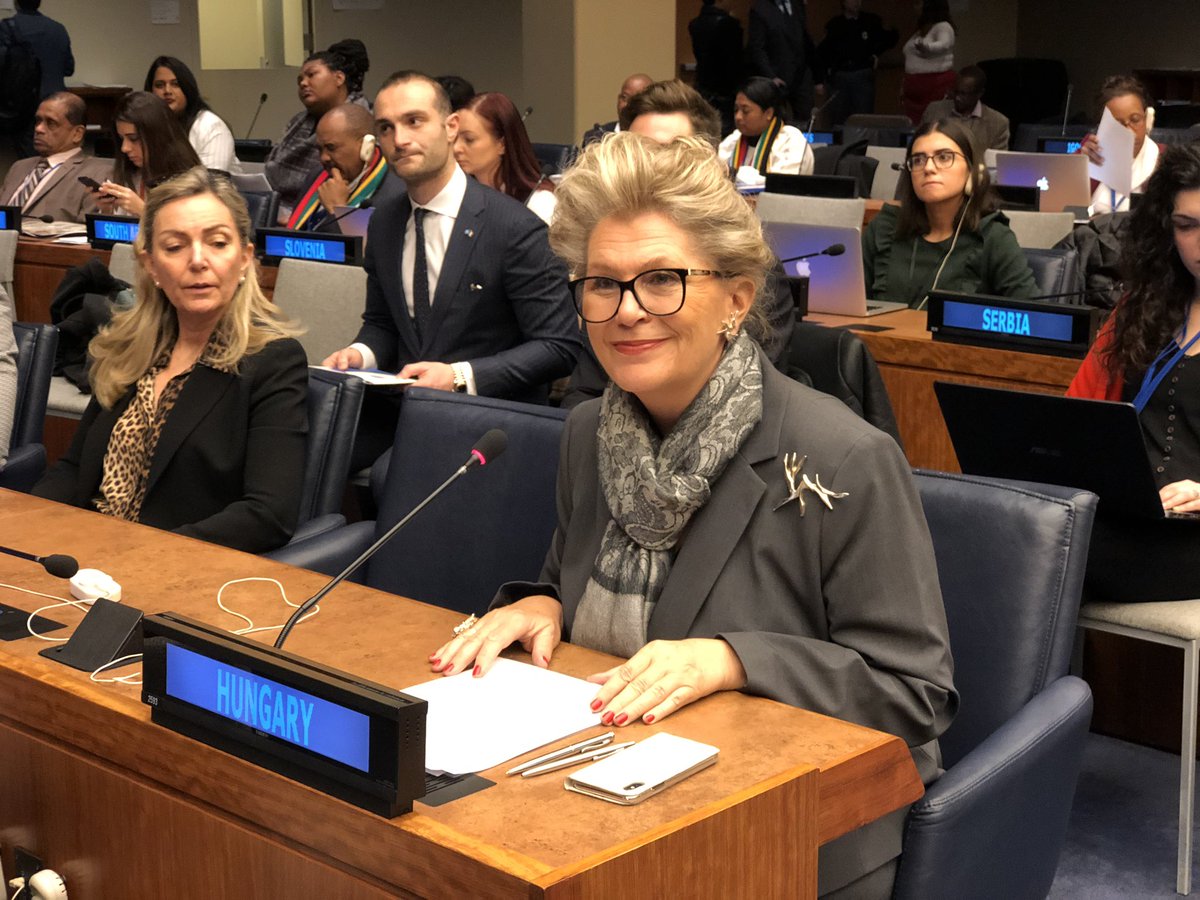
In her statement, H.E. Ambassador Katalin Annamária Bogyay, Permanent Representative of Hungary highlighted the importance of comprehensive, responsive and tailored social and family policies in achieving social inclusion of those who are often left behind, with special regard to women, children, the youth, persons with disabilities and large families, among others. Hungary’s complex childcare benefits, parental leave and subsidy schemes allow for enlarging the choices for young people, as well as parents with young children.
The Commission’s panel discussions, interactive dialogues and side events provided an opportunity to discuss policies and best practices related to its main focus areas – youth, families, indigenous peoples, persons with disabilities and ageing.
H.E. Mr. János Áder, President of Hungary participated in the High-level Meeting on Climate and Sustainable Development for All
H.E. Mr. János Áder, President of Hungary participated in the High-level Meeting on Climate and Sustainable Development for All, which was organized by the President of the General Assembly on 28 March 2019. On the margin of the High-level event President Áder also held bilateral meetings with H.E. Mr. António Guterres, Secretary General of the United Nations, H.E. Mr. Borut Pahor, President of Slovenia as well as with Alexander van der Bellen, President of Austria.
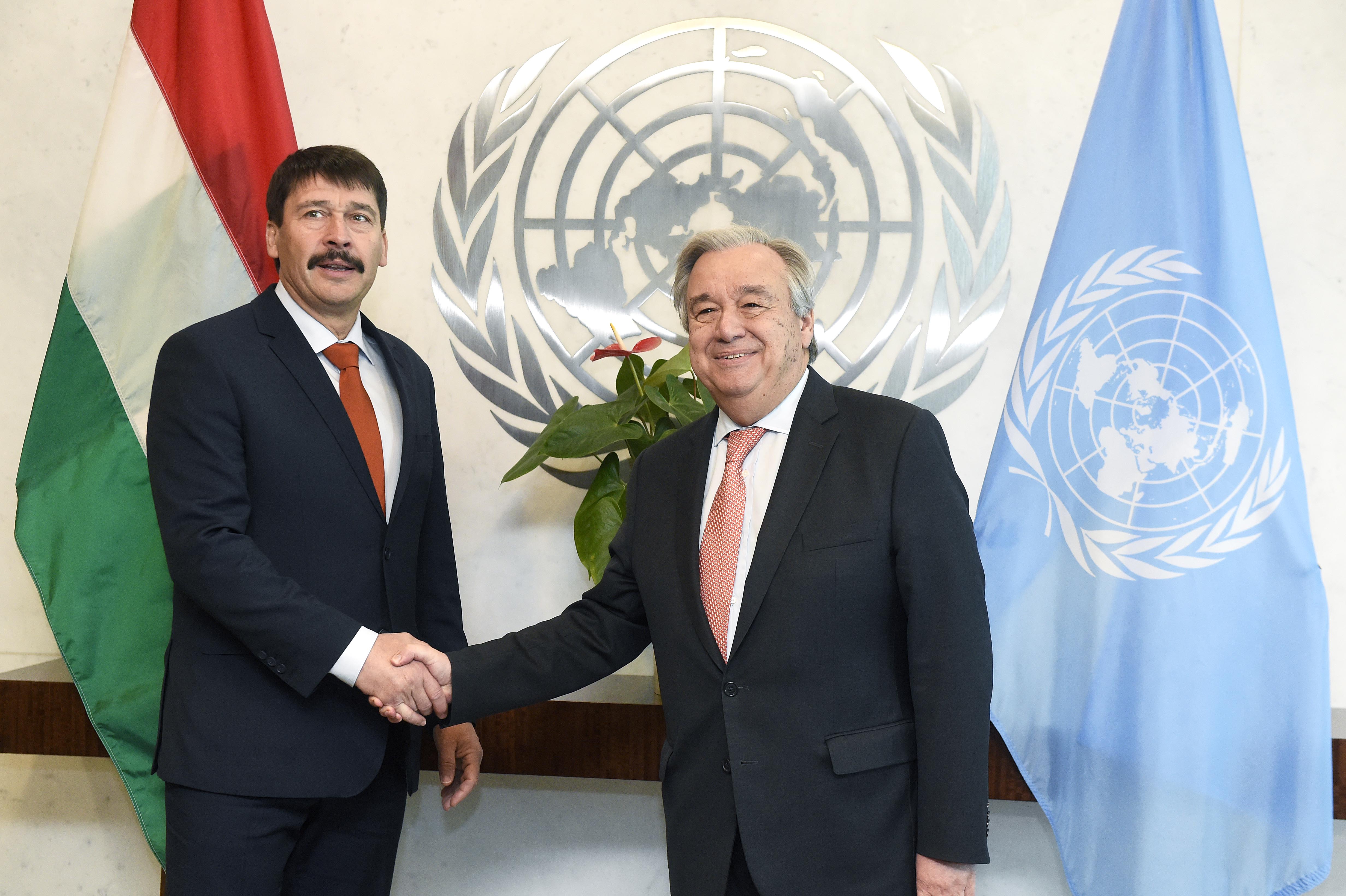
During the High-level Meeting President Áder highlighted that the situation caused by the climate change has worsened since the adoption of the Paris Agreement in 2015. We are far from our goal keeping a global temperature rise below 2 degrees Celsius above pre-industrial levels. The President also emphasized that there is no time left for not taking ambitious actions in order to fight against the climate change. In the last century the population has risen by 3,5 times, while the energy consumption increased by 10 times all over the world. In spite of reducing our CO2 emissions in the last three years, it even intensified. In the upcoming decades this trend will not likely to change. There are only two options to fight against the CO2 emissions, namely improve energy intensity and carbon intensity, while recycling our waste to natural resources. President Áder ended his speech with a quote from the former president of the United States of America, President Abraham Lincoln with the following: ‘You cannot escape the responsibility of tomorrow by evading it today.’
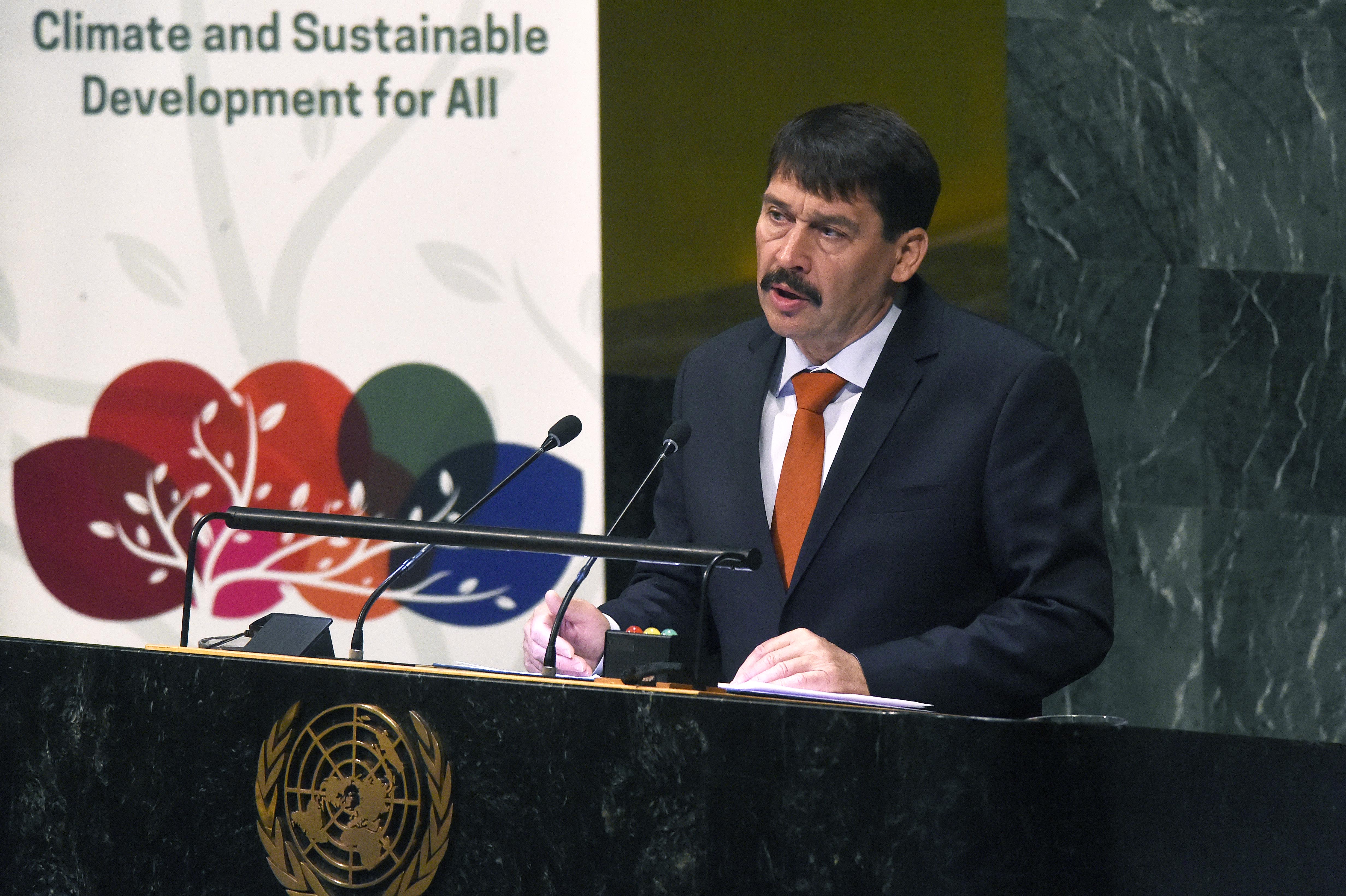
On the margin of the High-level event President Áder had a fruitful meeting with H.E. Mr. António Guterres, Secretary General of the United Nations on the future cooperation between Hungary and the UN. During his visit President Áder held bilateral discussions with H.E. Mr. Borut Pahor, President of Slovenia as well as with Alexander van der Bellen, President of Austria. President Áder also invited his partners to the upcoming Budapest Water Summit to be held in Budapest 15-17 October 2019.
Click here to read the speech of President Áder.
On 11 April, 2019, His Excellency Péter Szijjártó, Minister of Foreign Affairs and Trade of Hungary, addressed the Security Council at its Open Debate on Women in peacekeeping
H.E. Mr. Péter Szijjártó, Minister of Foreign Affairs and Trade of Hungary addressed the Security Council at its Open Debate on United Nations peacekeeping operations – Women in peacekeeping. Minister Szijjártó underlined the commitment of Hungary to contribute to the success of international peacekeeping operations as well as to the implementation of the Women Peace and Security agenda.
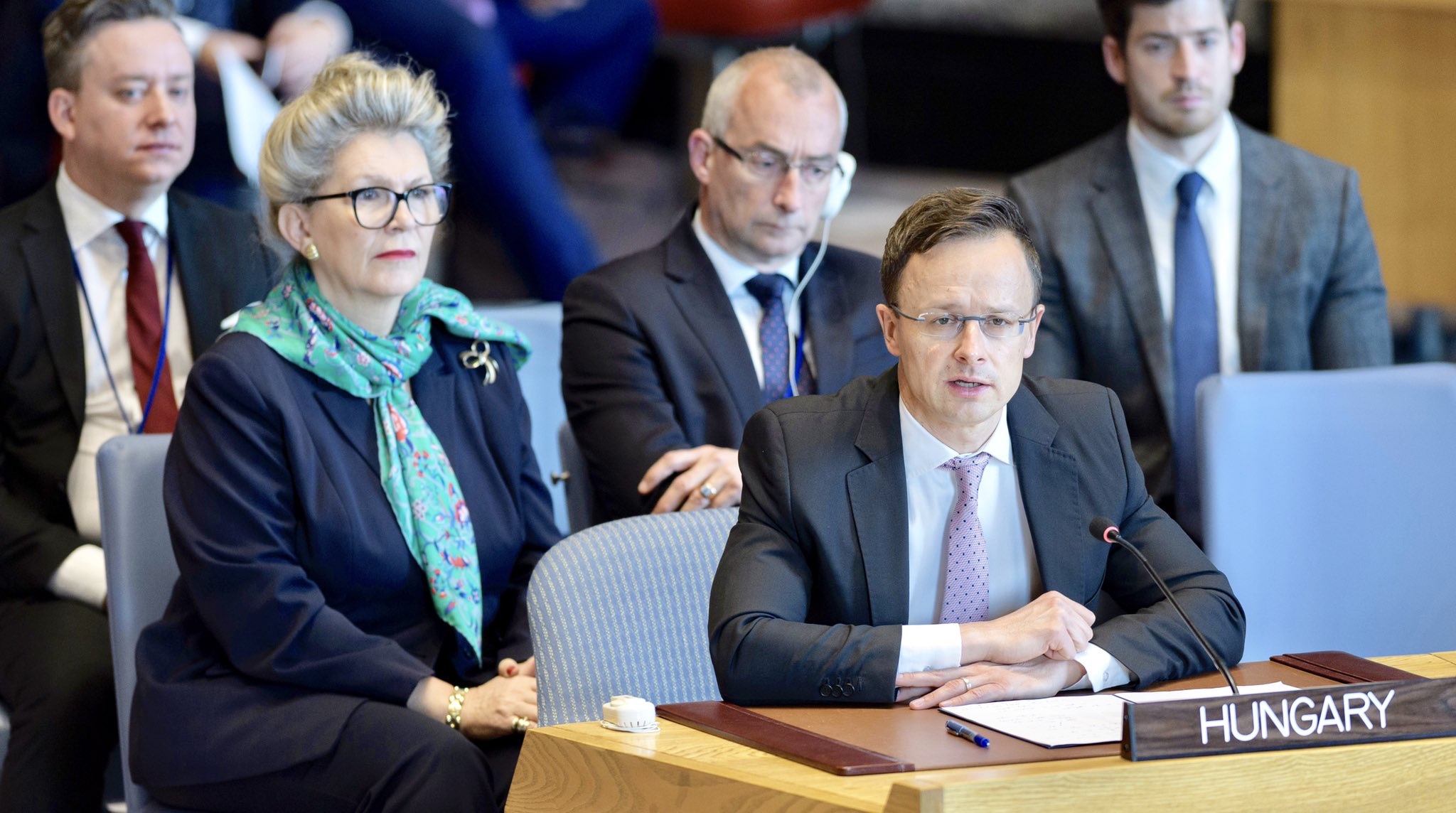
The Security Council under the Presidency of Germany held an open debate on 11 April on on United Nations peacekeeping operations – Women in peacekeeping. The meeting was chaired by Ursula von der Leyen, Federal Minister of Defence of Germany
H.E. Mr. Péter Szijjártó, Minister of Foreign Affairs and Trade of Hungary underlined that Hungary as a responsible member of the international community has always been committed to contribute to the success of international peacekeeping operations. Hungary considers peacekeeping as one of the most important functions of the United Nations and an extremely important instrument when it comes to the tackling the root causes of migration which is a major challenge around the globe. Minister Szijjártó highlighted the recent decision of the Hungarian government to increase the number of our troops serving abroad from 1000 to 1200 and this will allow us to increase the number of Hungarian peacekeepers in UN operations as well. In this respect Minister Szijjártó announced that we will deploy 60 additional peacekeepers to the UNIFIL Mission, who will serve in the Western sector of Lebanon. The Hungarian Minister of Foreign Affairs and Trade stressed the importance of the role of women in peacekeeping missions Minister Szijjártó noted that 20% of the staff of our Armed Forces and 23% of our Police are women. Hungary is committed to the implementation of the Women Peace and Security agenda and interested in understanding best practices. Although we have not made a national action plan in this field so far, but the guidelines of our Armed Forces on this matter has been under preparation.
H.E. Mr. Péter Szijjártó, Minister of Foreign Affairs and Trade of Hungary participated in the 2019 ECOSOC Partnership Forum
H.E. Mr. Péter Szijjártó, Minister of Foreign Affairs and Trade of Hungary participated in the 2019 ECOSOC Partnership Forum, which was organized by the President of the Economic and Social Council on 11 April 2019. On the margin of the event Minister Szijjártó also held bilateral meeting with H.E. Mr. Ghassan Hasbani, Deputy Prime Minister of Lebanon.
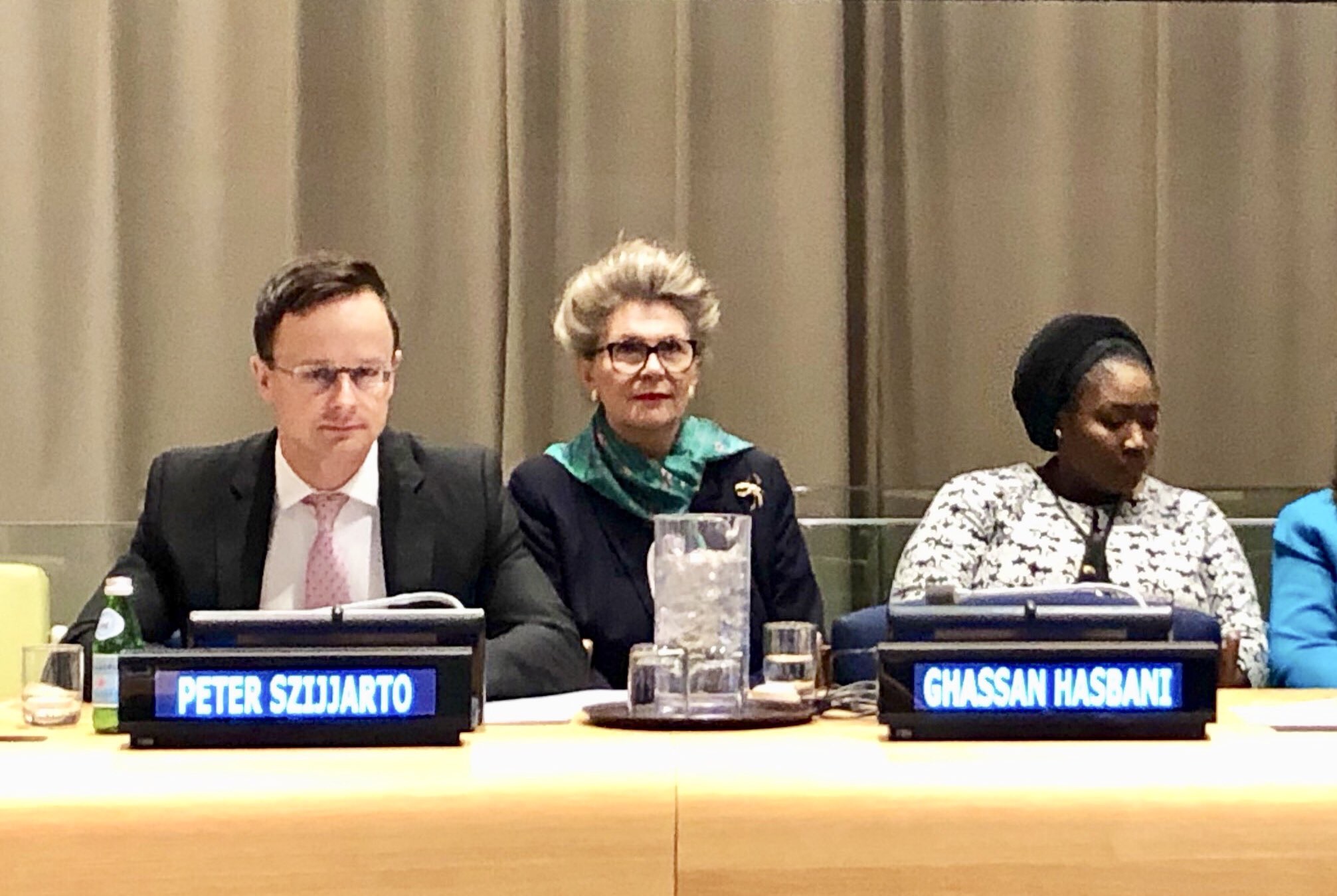
During his keynote speech, the Hungarian Minister emphasized the increased migratory flows which present extraordinary challenges to the international community. He reiterated Hungary’s policy tackling root causes by helping people, where needed around the world to stay in their homes under peaceful conditions. He stressed the importance of enabling the African continent’s ability to sustain a growing population, which will grow extensively by 2050.
Minister Szijjártó outlined four policies which the government has begun to implement in the last years: 1) utilizing people from countries in need who have competitive skills and knowledge that can contribute to the modernization of countries, which will enable them to live in modest circumstances; therefore the Stipendium Hungaricum scholarship program has been launched for students worth 60 million euros a year; 2) giving financial assistance to Christian communities in the Middle East to help rebuild churches and cover the operational costs of hospitals; 3) urging for special assistance programs for countries around war-torn areas that take care of millions of refugees; 4) more highly developed technologies along with financial assistance could enhance living standards in countries that people are leaving, which includes providing water, food safety, and enhancing agriculture to sustain a growing population, supported by a long-term credit structure for practical repayment.
The Minister stressed the importance of exchanging best practices in the implementation of the sustainable development goals between member states of the United Nations.
Circle of Women Ambassadors: Upholding the Rights of Women and Girls with Disabilities and Fighting Sexual Harrassment
On Monday, 15 April, on the occasion of the latest Circle of Women Ambassadors luncheon, the Permanent Mission of Hungary welcomed President of the General Assembly H.E. Ms Maria Fernanda Espinoza Garcés, Deputy-Secretary-General H.E. Ms Amina Mohammed, Executive Director of UNICEF H.E. Henrietta H. Fore, Under-Secretary-Generals H.E. Ms. Izumi Nakamitsu, H.E. Ms. Catherine Pollard, H.E. Ms. Alison Smale, as well as Assistant-Secretary-Generals, Ambassadors and Board members of Women’s International Forum, to discuss two key topics: the rights of persons with disabilities as well as preventing and eliminating sexual harassment at the UN.

Addressing a full house of high-level women UN representatives, Ambassadors and guests, President of the General Assembly H.E. Maria Fernanda Espinoza Garcés highlighted the importance of empowering persons with disabilities – 1 billion people around the world - in order to achieve the SDGs. Against concerning numbers of women and children with disabilities being left behind even more than men, she reminded of her campaign to achieve universal ratification of the Convention on the Rights of Persons with Disabilities, currently signed by 177 States Parties. Her Excellency recalled that at the General Assembly, only one Committee is chaired by a female representative and that among 21 vice-presidents of the GA, there is only one woman, thus calling on Member States to make all efforts to achieve gender parity at the UN.
Deputy-Secretary-General H.E. Ms Amina Mohammed underlined the important changes in the UN system in favour of gender equality, and affirmed, among others, the training of women and parental leave schemes as key contributors to women’s empowerment. She emphasized the crucial nature of eliminating stigma related to mental health conditions as well as disabilities, for the benefit of women.
H.E. Ambassador Jürg Lauber, Permanent Representative of Switzerland to the UN presented the Gender Champions Initiative, which he brought to New York, and encouraged Member States to adhere to the Network.
During the luncheon, Ambassador Bogyay also welcomed new Ambassadors, and facilitated an informal discussion among representatives sharing their ideas and initiatives.
The Circle of Women Ambassadors is a series of events hosted by the Hungarian Mission, giving an opportunity for women Permanent Representatives and Ambassadors to get together and talk about issues that are high on the UN Agenda.
